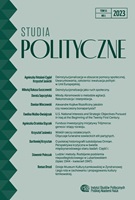Deinstytucjonalizacja jako ruch społeczny
Deinstitutionalisation as a Social Movement
Author(s): Mikołaj Rakusa-SuszczewskiSubject(s): Social development, Social Theory, EU-Accession / EU-DEvelopment, Sociology of Politics
Published by: Instytut Studiów Politycznych PAN
Keywords: deinstitutionalisation; social movement; reform; European Union;
Summary/Abstract: The article describes the history of the idea and phenomenon of deinstitutionalisation, that is, the process of transforming care institutions, in particular transferring their competences to local communities. These processes are illustrated using examples from the United States and Europe, discussions that have been going on there for decades, and the experiments and solutions being implemented in those regions. In this study, however, the phenomenon of deinstitutionalisation goes beyond a purely technical problem related to a change in the concept of managing the fate of people who are ill, disabled or affected by various social problems, such as homelessness. Here, deinstitutionalisation is above all a manifestation of the activities of social actors; that is, a social movement. The movement is not so much of a consensual nature, focused on the rationalisation of aid, as it is an ethical and even a conflict-oriented movement, in other words, a ‘new social movement’. The movement : (1) is represented by specific social actors: organisations and their leaders; (2) has its resources, values and identity to lobby for new legislation, implementation of new care and health practices, as well as shaping political and social attitudes in this sector; and, finally, (3) performs evaluative and critical functions, and is, therefore, a kind of ‘epistemic community’ that disseminated certain knowledge and demanded the implementation of the resulting practices.
Journal: Studia Polityczne
- Issue Year: 51/2023
- Issue No: 1
- Page Range: 35-62
- Page Count: 28
- Language: Polish

